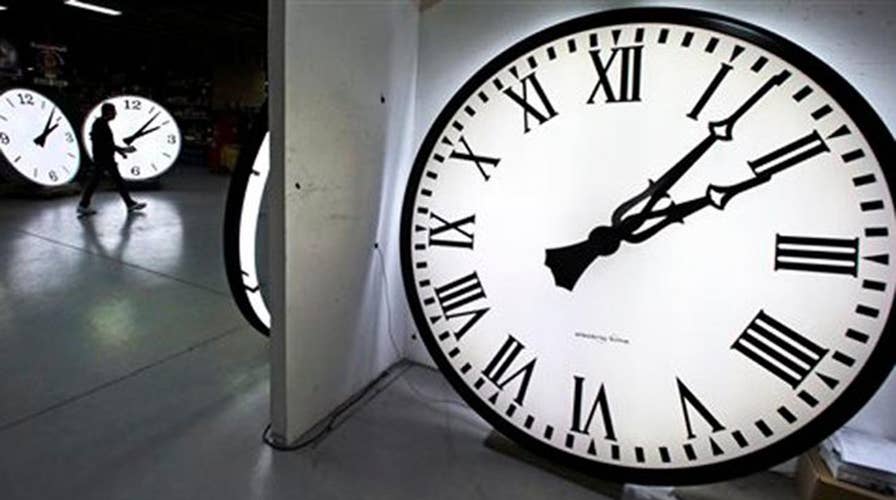Sen. Marco Rubio files bill to make daylight saving time permanent nationwide
Under the Sunshine Protection Act of 2019, Americans would set their clocks ahead one hour and keep them there, creating an extra hour of sunlight even in winter.
Americans will “fall back” for the 101st time in the predawn dark of Sunday morning, officially ending this year’s iteration of daylight saving time – the controversial practice first implemented in the United States in 1918 to help save on the cost of fuel.
To be precise, not everyone will have the luxury of an extra hour of sleep. Residents of both Hawaii and Arizona don’t practice DST at all. But those of us living in the other 48 states and Washington, D.C., will enjoy the annual treat of a 49-hour weekend.
Unlike many critics of the policy, I have no problem with the practice. In fact, I kind of like it.
DAYLIGHT SAVING TIME: WHEN AND WHY WE 'FALL BACK'
Looking back, I’ve always enjoyed the anticipation of the time change. That may sound silly to some, but our mother made a habit of reminding us of the power of positive expectations, encouraging us to favorably anticipate even incidental and seemingly small things like "falling back" and "springing ahead"
Her philosophy reminds me of a favorite line from the classic novel, “Anne of Green Gables.” Speaking with her friend Marilla, Anne wisely observes, “Looking forward to things is half the pleasure of them.”
There are a lot of things to like about the current set-up. In the case of alternating between DST and standard time, you get an extra hour of sleep on a Saturday night in the fall – and more daylight on spring and summer evenings. From my point of view, it also serves as something of a symbolic marker of the changing seasons.
Here we are arguing about losing and gaining an hour – but wouldn’t we be better off pondering how we spend our time overall?
Opponents of DST cite a laundry list of reasons for their agitation surrounding the biannual change, from suggesting the practice leads to sleep pattern disturbances, even citing research that purportedly suggests changing the time twice a year increases the risk of heart attacks, depression and suicide.
Rare exceptions notwithstanding, opposition to the tradition seem overwrought for one main reason:
We’re talking about one hour.
Three thousand six hundred seconds.
I suspect many who lament the loss of an hour in the spring have no problem staying out late for concerts or other happy occasions. Likewise, few seem to have their circadian rhythms upended by sleeping in for an extra hour from time to time.
And what about those of us who regularly travel between time zones? I’ve never heard of anyone who flies between just one zone complain of jet lag. Three or four, maybe. But not one.
It’s just not that big of a deal, especially in the long run.
To be fair, DST has enjoyed an uneven history, a fact that probably contributes to its controversial reputation.
Dating back to World War I, the law first ordering the tradition was so unpopular it was repealed nationwide in 1919 but retained in several major U.S. cities, including New York.
Between 1942 and 1945, President Franklin Roosevelt instituted the practice year-round, calling it “War Time” – all with the intent of saving funds and conserving resources for the war by maximizing the available daylight.
Citizens old enough to remember will recall there have been numerous adjustments to the century-old practice. Over the years the start and end dates have changed, most recently in 2007 when lawmakers extended DST, moving from April to March and October to November.
The biannual imbroglio brings to mind the old story of the Greek philosopher Demosthenes who was once teaching a listless crowd about matters of life and death.
The teacher began telling of a man who rented a donkey to carry sticks over a mountain. Halfway through the hot and sunny journey, the man stopped for a break and sat in the shade of the animal. The owner of the burro joined him but soon discovered there wasn’t room for both men.
An argument ensued as the owner of the animal contended he rented out the donkey – not the donkey’s shade.
The Greek academic then walked off the stage and the once-listless crowd suddenly grew restless and agitated, yelling out and wanting to know who ultimately owned the shade.
Demosthenes returned. “You didn’t seem to care about matters of life and death,” he chided them. “But you care about the trivial like the shade of a donkey!”
CLICK HERE TO GET THE OPINION NEWSLETTER
I sometimes wonder if we’re guilty of the same thing, especially when it comes to the debate about daylight saving time. Here we are arguing about losing and gaining an hour – but wouldn’t we be better off pondering how we spend our time overall?
Time is a finite resource. While we all have the same amount in a day, not everyone will enjoy the same amount of days in their lives.
More from Opinion
“Time is what we want most, but what we use worst,” wrote William Penn over 300 years ago – a reminder that times change but human nature doesn’t.
Instead of arguing about the hour – how about being grateful we have any time at all?
CLICK HERE TO GET THE FOX NEWS APP
So regardless of where you are on the spectrum of the DST debate, the words of the Roman poet Horace – contemporized over 2,000 years later by the late Robin Williams in the classic, “Dead Poet’s Society” still ring true:
Carpe diem.









































